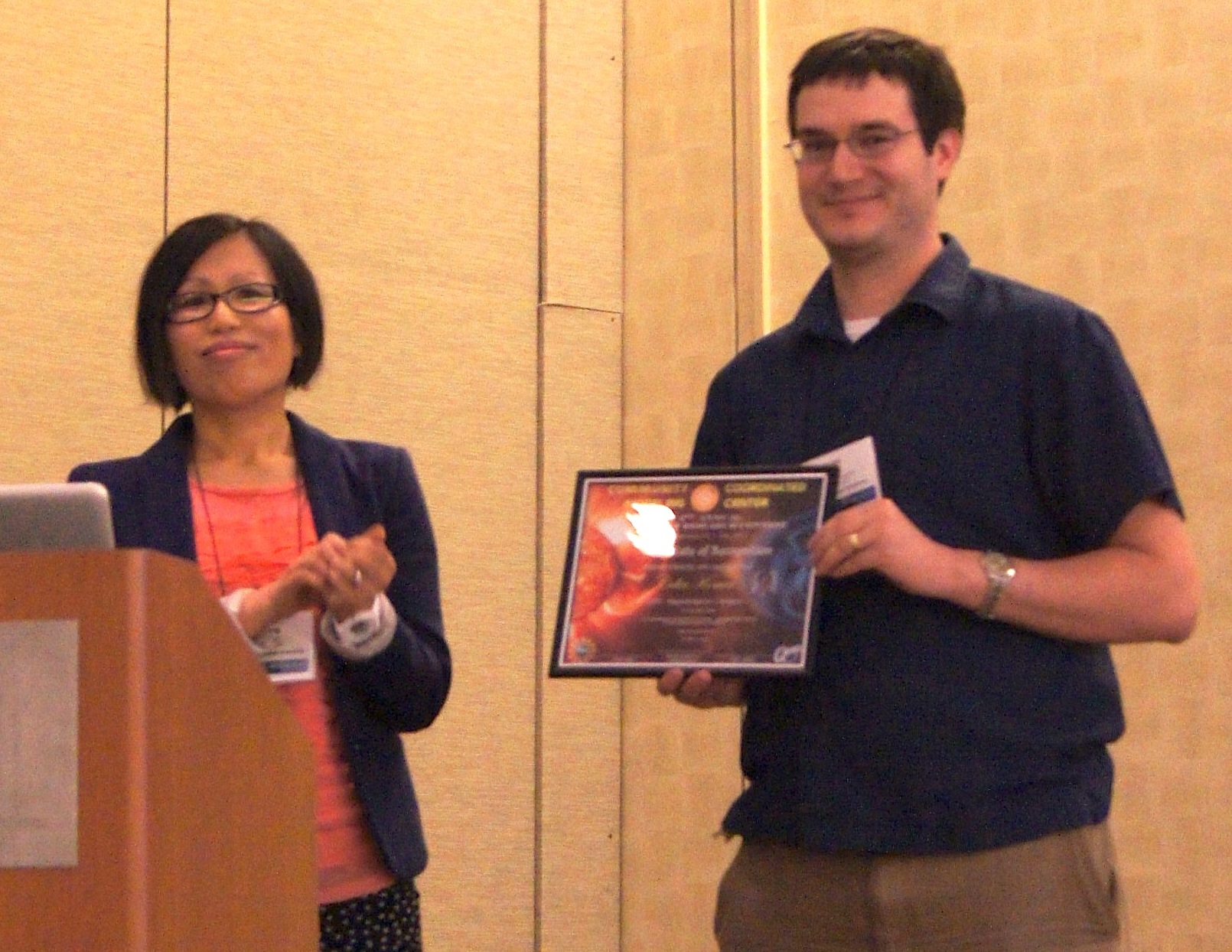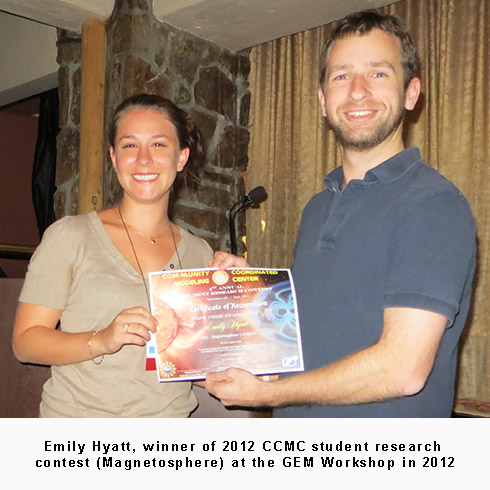CCMC Student Research Contest 2014
CCMC Student Contest winners: | 2017 | 2015 | 2014 | 2013 | 2012
 The Community Coordinated Modeling Center (CCMC) and National Science Foundation (NSF) are pleased to announce the third annual CCMC Student Research Contest!
The Community Coordinated Modeling Center (CCMC) and National Science Foundation (NSF) are pleased to announce the third annual CCMC Student Research Contest!
We invite undergraduate and graduate students who are using (or have recently used) CCMC tools and services in a research project or as a part of coursework to enter the contest.
Any students who participated in the first or second contest and are still involved in space research - we encourage you to submit a report on your new work!
New in 2014: A Space Weather category will be added to the existing Solar, Magnetosphere, and Ionosphere categories. Instructions for the categories can be found below:Instructions for the Solar, Magnetosphere, and Ionosphere categories:
- A successful project could involve the use of CCMC tools to demonstrate a physical process or concept in new and creative ways, or to gain new understanding of one of the many unanswered questions in space physics.
-
The report (not to exceed 10 pages) should include:
- a problem statement,
- description of the CCMC models and tools used,
- results,
- discussion,
- conclusions,
- and references.
- The report should include figures, at least one of which is generated with CCMC visualization tools, to convey the results in a clear and interesting manner. Ideally, a report can be used as a base for a paper. For projects completed as part of a collaborative effort, or under the supervision of a mentor, please include a statement describing which tasks were completed by the student.
- Winners in these categories will be invited to present their work at the 2014 CEDAR, GEM, and SHINE workshops. A fixed amount of travel support will be awarded to cover airfare and lodging (exact amount to be determined).
- Deadline for report submission is May 1, 2014. The reports will be evaluated and winners will be announced by mid May.
Instructions for the new Space Weather category:
- A successful project could involve the use of CCMC tools to study space weather phenomenon and impacts on manmade systems in space and on the ground. The project will investigate space weather in new and creative ways, or to gain new understanding of one of the many unanswered questions in space weather.
- The report (not to exceed 10 pages) should include a problem statement, description of the CCMC models and tools used, results, discussion, conclusions, and references. The report should include figures, at least one of which generated with CCMC visualization tools, to convey the results in a clear and interesting manner. Ideally, a report can be used as a base for a paper. For projects completed as part of a collaborative effort, or under the supervision of a mentor, please include a statement describing which tasks were completed by the student.
-
One or more winners in the Space Weather category will be invited to present their work at the 2014 Space Weather Workshop (http://www.swpc.noaa.gov/sww/).
A fixed amount of travel support will be awarded to cover airfare and lodging (exact amount to be determined). - Deadline for report submission is February 18, 2014. The reports will be evaluated and winners will be announced by the end of February.
A panel of scientists, none of whom will be CCMC staff members, will evaluate the reports. Therefore, students are encouraged to contact CCMC staff members regarding the models and tools available, for consultation on possible research projects, or for assistance with submitting runs or visualizing results. The full list of staff members is here
For examples of previous winning reports, see Results of the First and Second CCMC Student Research Contest.
Results of the Third CCMC Student Research Contest
Contest Application
Student Research Contest Application Form
Student Research Contest Application Form (in PDF)

CCMC Tools and Services
- Runs-On-Request service - Tutorial
- Interactive On-Line Visualization of simulations results - Tutorial
- Kameleon access and interpolation library
- Space Weather Explorer (3D visualization tool) - Tutorial
- Integrated Space Weather Analysis System (iSWA) - Tutorial
- StereoCAT - Coronal Mass Ejection Analysis Tool
- Database of Notifications, Knowledge and Information (DONKI)
- Scoreboard
Contacts
- Rebekah Evans, CCMC, Rebekah.e.frolov@nasa.gov
- Antti Pulkkinen, CCMC, antti.a.pulkkinen@nasa.gov
- Masha Kuznetsova, CCMC, Maria.M.Kuznetsova@nasa.gov
- Therese Moretto, NSF, tjorgens@nsf.gov
- Full list of CCMC staff members
Students are encouraged to learn more about research opportunities using CCMC tools and services during community Workshops, by contacting CCMC staff and other scientists familiar with CCMC tools and services.